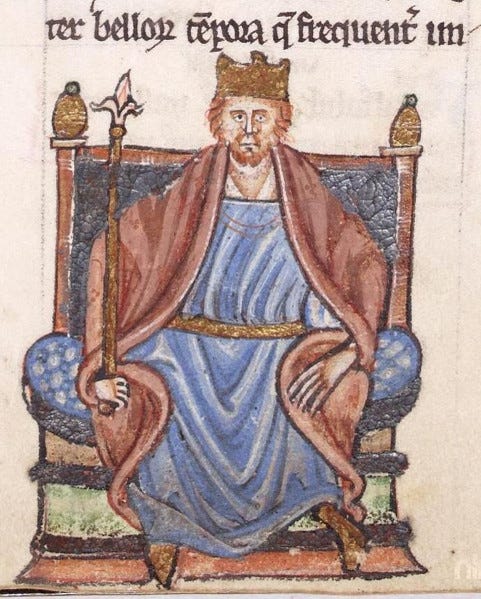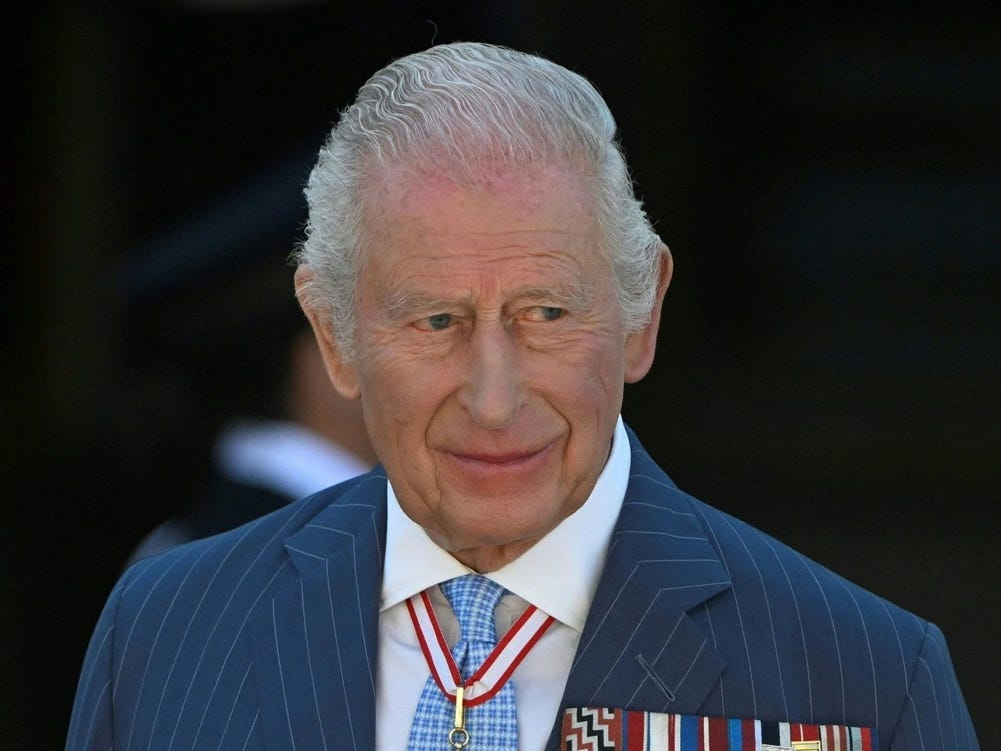The Endgame
Newsletter #108 - Two kings
Toronto, June 1, 2025
Two Kings
King Henry II died in 1189, but we remember him still (okay, maybe not all of us). Why? Not because of history books. Few people read those anymore. Although, if you look into one—for example, M.T. Clancy’s Early Medieval England—it sounds like Henry II was a pretty exciting guy. Clancy writes of Henry: “[H]is dominance depended upon personal qualities rather than on luck or on inherited institutions. He created the illusion of an Angevin Empire by grasping opportunities and by hard riding.” Wikipedia reports that Henry “was infamous for his piercing stare, bullying, bursts of temper, and, on occasion, his sullen refusal to speak at all.”
These days, people watch, not read. (Even Dr. Johnson, in the 18th century, said of books, “I don’t read them but I do look into them.”) Now, we remember Henry II, not because of history books, but because of a poet, T.S. Eliot, and an actor, and Peter O’Toole. Eliot wrote the famous verse drama Murder in the Cathedral about the assassination of Archbishop Thomas Becket in Canterbury Cathedral. Four knights killed Becket, encouraged (but not directly commanded) to do so by Henry, who was in a bitter dispute with the church. The inestimable Chat GPT tells us that “the play’s first performance had an unmatched spiritual and historical gravity. Its success led to widespread acclaim and positioned Eliot not only as a poet but as a major modern playwright.”
Henry is not a character in Murder in the Cathedral, but his brooding presence overhangs it. In the second part of the play, one of the assassins, the Third Knight, says: “Our master ordered nothing./ He told us nothing./ He is guiltless of this deed, but we had to serve him,/ To prevent a greater evil.” This evokes the phrase traditionally attributed to King Henry II which set in train the calamitous death of Becket: “Will no one rid me of this turbulent priest?” (Which reminds the modern reader of the baptism scene in Francis Ford Coppola’s film The Godfather when Michael Corleone, standing as godfather at his nephew's baptism, renounces Satan at the exact moment his enemies are being murdered on his orders.)
Peter O’Toole played Henry II in the 1968 film The Lion in Winter, which is about Henry’s emotional attempt during a family gathering to establish a line of succession—sort of a medieval version of the TV series Succession. Henry is depicted as a once-great ruler now old and in decline, overcome by emotional and political weariness, and facing the limits of his power. Critics loved the movie and it won three Academy Awards.
There have been thirty-seven monarchs since Henry II. Now we have King Charles III. Charles ascended the throne when he was 73. He’s had a gilded life, but a hard one. He had a tragic first marriage. He is estranged from one of his two sons. He is being treated for cancer. He is not allowed to speak out out on issues of the day (often there is a strong sense that he is straining at the bit). His job requires him to wear silly costumes and strings of medals, to be endlessly polite to random people, and to be subject to savage media scrutiny. Like Henry II, he has bursts of temper (at one royal signing ceremony, a pen leaked ink on his hand and the microphone caught him saying, “I can’t bear this bloody thing… every stinking time.”)
I watched King Charles carefully on television when he was in Ottawa last week to open the Canadian parliament. He mingled with distinguished Canadians, exchanging pleasantries, as if at a high-society cocktail party. He read words that the government had put into his mouth. He stood silent as a twenty-one gun salute was fired in his honour. He looked determined, but sad. A lion in winter?
*****
Some reader comments on Newsletter #107 (“The Cheshire Cat”)
Patricia Chisholm writes from Barcelona: “Have just been through the never finished cathedral by Gaudi, I think the Cheshire Cat would fit in nicely in the cathedral, strangely organic, an endlessly dream like experience. Gaudi himself set up the stages of the construction so it would continue long after his death. He liked the idea of carrying on. I’m more on the poets’ side than yours, but I think it’s about holding on to emotion, not actions. Continuing to feel, that’s the challenge. What living should always be about, first.”
From Pam Purves in Nova Scotia: “I am definitely with the self-contained, self-confident, mischievous cat. Go out with a grin and a flick of the tail. As if to say, ‘take that!’”
A sad comment from Karen Bayley: “I was never relevant or visible. I always hoped I would be. At 68, I know I’ve failed. That’s a hard pill to swallow. Yet I can’t think of one thing I would change. I gave everything my best shot. Some are doomed to insignificance.”
From Anna Porter: “Some time after he sold his company, McClelland and Stewart, and tried, unsuccessfully, to become a literary agent, a woman came up to Jack at a funeral reception and asked, ‘Didn’t you used to be Jack McClelland?’ Jack allowed that he had, once...”
A reader comments: “As dear retired politician friend of mine said, ‘It takes no time at all to go from a who's who to a who's he!’”
From Martin Levin, former books editor at The Globe and Mail: “Fairly early on in my tenure at The Globe, I realized that most of the acquaintances and respectful relationships I made would not long (if at all) survive my retirement, that many were owing to position, not person. I have always been fine with that. It is the way of the world, and I count myself lucky to have had a good run at all.”
From Eve McBride: “Age is about loss. To combat that we have the regenerative strength of memory. It washes over us like a powerful surf, sweeping us into a vivid and vital past. And sadly, it also brings an undertow, threatening to pull us from what was to what is. Don’t give ‘what is’ any hold. ‘What was’ is always there, not as an escape but as a reminder of happy & tragic events, failures and successes, love and lovers, the underscoring of family. Retreating into memory is a kind of time travel, where you immerse yourself in all the happenings and people that made you what you became, what you are. Memories. Celebrate them, cash in on them. They are a sustaining mindfulness that make a day worthwhile.”
From John: “Excellent piece and sage advice. I was assembled (through the kindness of three generations of my family) into Highland dress yesterday and attended a lovely wedding. I noticed that I was diminishing in height - no use raging about that either!”
From Julian Porter: “The picture of Olivier as Lear is perfect for the play. Marvellous. But the truth is my energy is slipping and rage is to be saved for getting out of the shower. Still life is pretty interesting with Trump, friends, memories and writing. Memories of Chartres, Stanfield, Lougheed, Rembrandt, jury trials, Thatcher, Lee Quan Yew, Robarts Trudeau Senior, appearing by invitation to address the Supreme Court about art, guiding in all of Europe’s major galleries. Many close friends have passed away. I’m lucky to be here.”
From the psychiatrist Sandy Horodezky: “While I'm still (barely) relevant, many of my patients can relate to this cogent line from King Lear, ‘How sharper than a serpent’s tooth it is to have a thankless child.’”
From Arthur Schafer, professor of philosophy at the University of Manitoba: “You see the play as about ageing, in Lear’s case badly. That interpretation makes a lot of sense. But I have always seen the play as about more about feudalism and less about ageing. ‘I love you according to my bond, nor more nor less,” says Cordelia (a little bit unkindly), in response to Lear’s challenge to his girls to tell him how much they love him – just as he is about to divide up the land of his Kingdom. Lear is tragically blind to the fact that life and fate are tied up with the feudal great chain of being. ‘Bonds’ are what define and sustain society. By relinquishing his property, dividing his kingdom among his daughters, Lear is violating the natural order of the cosmos. King’s rule in virtue of their ownership of land. Divesting oneself of one’s property isn’t an option... Lear grew old without having grown wise, as the Fool reminds him. Ageing is clearly an important theme. But the wisdom Lear fails to achieve, Shakespeare is telling us (on my interpretation, at least), is the wisdom recognizing that society cannot work if people are ambitious and self-seeking (i.e., capitalist men and women). Ownership of land defines one’s proper role in society, so self-dispossession by a King must lead inexorably to the disintegration of society.”
David Wolinsky writes: “I would have thought that the reference to aging non-kings or presidents who write memoirs (my last and forthcoming books), rely on loudly exaggerating past achievements (my morning memos), create the elaborate self-congratulatory websites, or make controversial statements hoping to attract attention in an effort to cling to relevance and reputation (my messages on your great columns), could apply to me, but then I remembered unlike Biden I’m getting exponentially better every day so no problem.”
And finally, I thank my friend Jim Turk for this comment: “I really look forward to your Endgame newsletter every Sunday, but I think you were a bit off the mark in last week's ‘The Cheshire Cat.’ You divided us older folks into two categories: those who ‘vanish gracefully’ and those ‘fight tooth and nail to stay visible.’ You miss a third category which I think both you and I are in—those who remain active and sometimes very visible, sometimes not, doing what we love. I never thought of your now 107 issues of Endgame as you ‘raging against the night’ but as a continuation of your love of writing. I feel the same way about the work I do heading the Centre for Free Expression [at Toronto Metropolitan University]. I really enjoy the work I get to do and the large number of people I get to work with, and the chance to continue the social and political activism that has engaged me most of my adult life. Some of my friends love fishing, Others turn to pottery in their elder years or take art lessons. And some are driven to end their lives with a bang, not a whimper. But you and I do things that continue our passions from earlier years that give us pleasure. I don't feel like the Cheshire Cat nor like King Lear, not do I expect you do.”
*****
Note to readers: I’m travelling the first part of June. Next week’s Endgame will be a guest column by the psychiatrist and author Dr. David Goldbloom.




Let us not forget that Henry had as wife the brilliant, inimitable, indomitable Eleanor! I believe he did not speak to her for long periods but she was a force. Must have kept his mind lively even at their most strained times. Nothing like a thorn in your side to keep you alert to possibilities.
True, Peter O'Toole outdid himself as Henry II in "Becket" ... with an assist from Richard Burton. A truthful depiction or not, O'Toole will forever be Henry II in our minds.